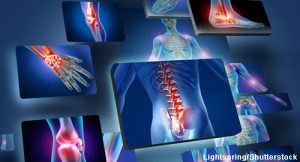 Two roads diverged in a cancer ward. One led to chemotherapy, and the other to immunotherapy. Although the latter is a much-celebrated route, it’s not without its drawbacks.
Two roads diverged in a cancer ward. One led to chemotherapy, and the other to immunotherapy. Although the latter is a much-celebrated route, it’s not without its drawbacks.
True, if one had to choose, it’s preferable to contend with a musculoskeletal issue rather than an oncological one. However, the drugs used in immunotherapy—immune checkpoint inhibitors (ICIs)—may cause serious adverse effects, with the most common rheumatic condition being ICI-induced inflammatory arthritis.
Research from the Johns Hopkins University School of Medicine, Baltimore, set out to examine musculoskeletal ultrasound findings in patients with ICI‐induced inflammatory arthritis. The study, “Sonographic Findings in Inflammatory Arthritis Secondary to Immune Checkpoint Inhibition: A Case Series,” was published in the July 2019 issue of ACR Open Rheumatology. It’s the first systematic effort using musculoskeletal ultrasound to evaluate patients with ICI‐induced inflammatory arthritis and describe its related imaging features.1
Cancer Cells Play Hide & Seek with the Immune System
Jemima Albayda, MD, is the director of the Musculoskeletal Ultrasound and Injection Clinic and assistant professor of medicine in the Division of Rheumatology, Johns Hopkins. She says, “With ICIs, we now have the ability to harness the immune system in the fight against cancer, something that has long been the dream of oncologists. These impressive drugs, which are effective even in the most dire cases, are now FDA approved.
“Although these drugs have done wonders for many people, essentially unleashing the immune cells so they can block the checkpoints cancer cells use to shut down the immune system, other problems may arise. Letting the immune system ‘rip’ can cause unusual manifestations that we still do not fully comprehend. Problems have arisen in every organ; and although the larger side effects—colitis, gut pain, etc.—are easily detected, joint pain is not something people always pay attention to,” she says.
Education
Laura Cappelli, MD, MHS, is an assistant professor of medicine at the Johns Hopkins University School of Medicine, Division of Rheumatology, and a faculty member of the Johns Hopkins Arthritis Center. Her research focuses on understanding the mechanisms and treatment of ICI-induced rheumatologic complications. “At Johns Hopkins, we have an ICI team working on educating oncologists so they will be alert for any joint issues and refer these patients to us in rheumatology. Many people initially think, ‘Oh, it’s just run-of-the-mill joint pain.’ But often, there’s significant functional impact and joint damage.”





